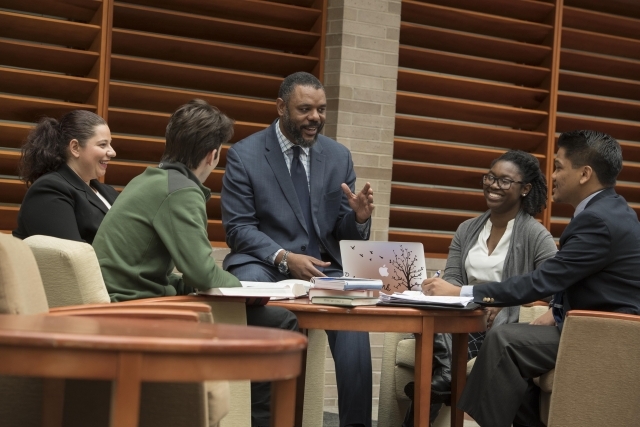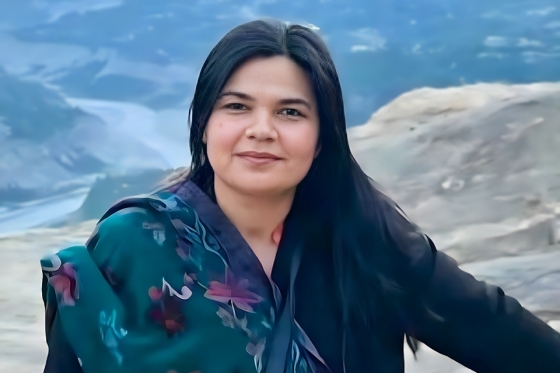

GR
World History, Doctor of Philosophy
Earn a Ph.D. in World History at St. John's University in New York City!
- Home
- Academics
- Majors and Programs of Study
- World History, Doctor of Philosophy
The innovative Ph.D. in World History at St. John’s redefines and reclaims the vital roles that professionals with advanced humanities training play in our complex, global society. It combines traditional academic rigor in research with coursework and teaching experience in global history.
The Department of History’s full-time faculty members are innovative and accomplished scholars with expertise in Africa, Asia, Europe, the United States, Latin America, and the Middle East. As a doctoral student at St. John’s, you will benefit from close mentoring relationships with your professors, and you will become part of our vibrant and diverse intellectual community. Our program includes full-time doctoral students as well as part-time students pursuing their doctoral degree while working full-time in fields such as education, business, public history, and public service.
Department Faculty
Please see a list of our History faculty.
Department Contact
Lara Vapnek, Ph.D. Professor and Graduate Director, 718 990-5230, [email protected]
- Degree Type
- PhD
- Area of Interest
- History
- Associated Colleges or Schools
- Program Location
- Queens Campus
- Required Credit Hours
- 60
Admission
To apply to the Ph.D. in World History, you must submit official transcripts showing conferral of your bachelor's degree and at least 24 credits in history. You must also possess at least a cumulative GPA of 3.0 at the undergraduate level, with a 3.5 or higher in history courses.
You must submit three letters of recommendation, at least one of which attests to your research ability. You must also submit a recent sample of written work, as well as a personal statement detailing your research agenda, professional goals, and experience.
Applicants who already hold a master's degree in history may qualify for up to 18 credits of advanced standing with approval from the graduate director and the Dean's office.
The deadlines for admission to the Ph.D. World History program are as follows:
- Fall: April 1 for admission and January 15 for fellowship/assistantship consideration
- Spring: November 1
For additional information, please contact:
Office of Graduate Admission
718-990-1601
[email protected]
Tuition and Financial Aid
Fellowships and Assistantships
The University awards a limited number of graduate assistantships and doctoral fellowships to highly-qualified students each year. These positions provide tuition remission and a stipend and involve assisting faculty with their research and teaching. For more information, please visit Graduate Assistantships and Fellowships and Tuition and Financial Aid.
The Nickolas Davatzes Scholarship
The Department of History offers the Nickolas Davatzes Scholarship to qualified graduate students. The scholarship fund was established in 2007 by Nickolas Davatzes ’62C, ’64G, ’95Hon, who established the A&E Network and the History Channel, and Dorothea Hayes Davatzes ’66Ed. Scholarships are granted by the department on a competitive basis and provide $5,000 for summer research or tuition assistance.
Courses
The Ph.D. requirements include 60 credits of coursework, internship, and dissertation research. The breakdown of program requirements is as follows:
HIS 401 Modern Historical Research (3 credits)
This course, which you will complete in your first semester of coursework, provides a general background in theory, historiography, research skills, and methodology.
Seminars (choose four, 12 credits):
- HIS 701 World History Seminar in Gender and Sexuality
- HIS 702 World History Seminar in War, Peace, and Revolution
- HIS 703 World History Seminar in State and Society
- HIS 704 World History Seminar in Historical Identities
- HIS 705 World History Seminar in Technology and Science
- HIS 706 World History Seminar in Production, Consumption, and Trade
- HIS 707 World History Seminar in Cities and Countryside
- HIS 708 World History Seminar in Diasporas, Migrations, and Borders
- HIS 709 World History Seminar in Ideas and Culture
Electives (nine courses, 27 credits)
You will choose your elective credits from a wide range of thematic and geographically-based offerings. You may also apply additional world history seminars as electives.
Teaching Internships (two semesters, 6 credits)
Students will assist a professor teaching World History or pursue an internship in one of the following areas:
- Libraries and archives
- Parks and heritage tourism
- Publishing, editing, and production
- Teaching high school and college history
- Museums and galleries
- Non-profit, non-governmental organizations and governmental agencies
Alternatively, students may choose to take two additional elective courses.
Foreign Language (non- credit requirement)
You must demonstrate reading proficiency in at least one foreign language appropriate to your dissertation research.
Annual Portfolio (non-credit requirement)
To help the faculty assess your progress toward the degree and completion of your dissertation, you will maintain an annual portfolio of departmentally-approved examples of your work, as well as evidence of your progress in developing professional skills and experiences. You will present the portfolio, along with a summary essay discussing your evolving body of work and professional interests, for annual review while in the program.
Dissertation (12 credits)
Once you’ve met the above requirements, you’ll register for a Dissertation Workshop (HIS 975) to develop your prospectus and to workshop your dissertation chapters. Students enroll in four semesters of this workshop for 3-credits each and then continue to enroll in a one-credit version of the class until they defend their dissertation.
Career Outcomes
The communication skills, analytical thinking, and historical knowledge you gain through the Ph.D. program in World History will enhance your career as a secondary school teacher, prepare you for a tenure-track faculty position at a community college, or provide you with valuable skills for careers in museums, libraries, cultural agencies and institutions, consulting firms, and media companies. The distinctive socially-aware, problem-solving, and service-oriented education you receive at St. John's will help you excel in the areas of teaching, public history, and public service.
Each semester you will join a graduate colloquium dedicated to professional training. By attending graduate school in New York City, you will gain access to a wide array of cultural institutions dedicated to advancing knowledge in the humanities. As a graduate student at St. John's, you will benefit from the individual attention of the faculty members in the Department of History who will work with you on articulating and developing your career goals.
Success Stories
New Alumna Achieves Her Dream Through St. John’s Part-Time Ph.D. Program
Erum Hadi’s lifelong goal of becoming a scholar of South Asia history became increasingly elusive as she turned her attention to raising a family and working full time.
Highlight
Erum is grateful that St. John’s doctoral program accommodates students who need to pursue their studies part-time by conducting classes in the evening so they do not interfere with students’ day jobs and family obligations.
Interested in History, but not sure if World History, Doctor of Philosophy is right for you?
Related Programs
UG
American Studies, the first and most well-established interdisciplinary field in the United States, is recognized as a vital component of vocational preparation for students considering careers in government, administration, public policy, business, education, management, and law.
The American Studies interdisciplinary minor consists of 18 credits, with distribution requirements in three disciplinary groupings.
- Queens Campus
UG
The combined Bachelor of Arts (B.A.) and Master of Business Administration (M.B.A.) in History and Business Administration offers highly-motivated students the opportunity to complete both undergraduate and graduate degrees in five years of full-time study.
- Queens Campus
UG
Earning a degree in history provides students with a comprehensive understanding of the issues and events that shape today’s global society. Studying history is also a proven way to develop the analytical and communication skills necessary for success in most fields, including business, law, journalism, public policy, and teaching.
- Queens Campus
UG
Your history degree will provide you with a comprehensive understanding of the issues and events that shape today’s global society. Studying history is also a proven way to develop the analytical and communication skills necessary for success in most fields, including business, law, journalism, public policy and teaching. Jobs for history teachers alone are expected to rise 13 percent over the next few years.
- Queens Campus
UG
The combined Bachelor of Arts (B.A.) / Master of Arts (M.A.) program in History offers highly-motivated students the opportunity to complete their undergraduate and graduate degrees in five years of full-time study.
- Queens Campus
GR
In the Master of Arts (M.A.) program in History at St. John’s, you will enjoy seminar-style classes that build a broad knowledge of history’s main currents, along with the opportunity to specialize in an area of concentration.
- Queens Campus
UG
Familiarize yourself with Italian language and culture with a minor in Italian American Studies!
- Queens Campus
GR
Earn an ALA-accredited master's degree in Library and Information Science online!
- Online
UG
The Urban Studies Minor is an interdisciplinary minor that allows students to learn through various disciplines across St. John's College of Liberal Arts and Sciences.
- Queens Campus


